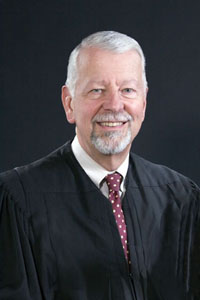Groups appeal order to turn over documents in Prop 8 case

Judge Vaughn Walker
A snag in completion of the landmark Proposition 8 trial has now become a full-fledged entanglement. The issue? Whether three groups that are not a party to the Perry v. Schwarzenegger lawsuit can be forced to turn over their own e-mails and memoranda to the defendants in the case.
The defendants are the groups that sought and promoted the November 2008 initiative that amended the California constitution to ban same-sex marriage. Those groups were compelled to turn over their e-mails and memoranda to attorneys challenging the initiative in the U.S. District Court in San Francisco. In a sort of tit-for-tat move, the Yes on 8 groups filed a motion asking No on 8 groups to turn over their documents.
Proposition 8 trial Judge Vaughn Walker this week upheld the March 5 decision of a magistrate judge to order the No on 8 groups to turn over their documents that “contain, refer or relate to arguments for or against Proposition 8.”
One of the three groups—the Californians Against Eliminating Basic Rights (CAEBR)—said it believes it has already sufficiently complied with the motion. The two other groups—the ACLU and Equality California—challenged the magistrate’s motion, saying it would have a chilling effect on the willingness of organizations and individuals to participate in the political process.
In a 24-page opinion released Monday night, March 22, Walker said he believes the magistrate properly limited the documents that must be disclosed. He gave the groups until March 31 to produce the documents.
The ACLU and Equality California filed a motion Tuesday, asking Walker to delay his order while they appeal the decision to the 9th Circuit U.S. Court of Appeals.
The motion for stay says the order compelling they produce their internal communications to defendants in the case “implicate issues of a fundamental nature under the First Amendment with consequences not merely for this case but for future election campaigns of all sorts.”
The ACLU and Equality California brief seeking the stay argue that they—as third-party non-profit advocacy groups – are being “subjected to burdensome and invasive discovery as a result of their efforts to protect the civil rights for a politically unpopular group.”
Judge Walker is likely to rule very quickly on the request to delay is original decision. That decision maintained the magistrate judge’s deadline of March 31 for the groups to start turning over documents. He also moved back the deadline for defendants to submit to him any other evidence they wished him to consider in his deliberations over the Perry v. Schwarzenegger case—from March 26 to April 16. Walker indicated in January, following three weeks of testimony, that he would review the evidence submitted in the case before setting a date for closing arguments.
An earlier side-dispute in the litigation—one concerning the limited closed-circuit broadcast of trial proceedings to a number of courtrooms around the country—ended up before the U.S. Supreme Court. The high court, in a 5 to 4 decision, ruled that the trial proceedings could not be made public.


Leave a Reply